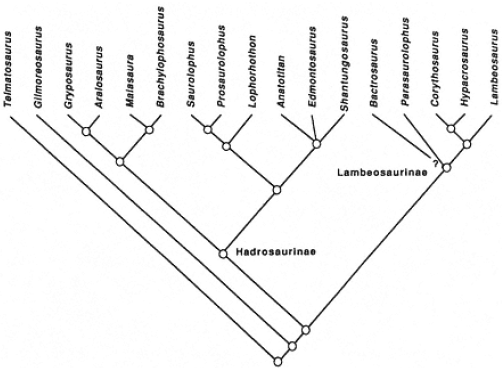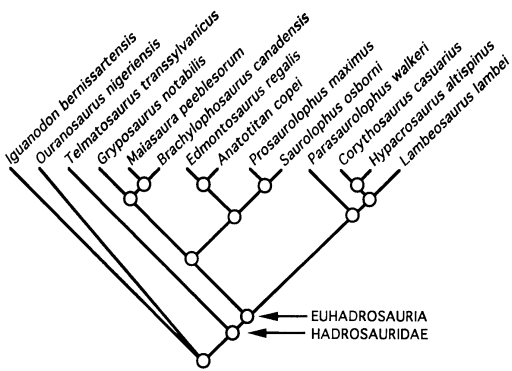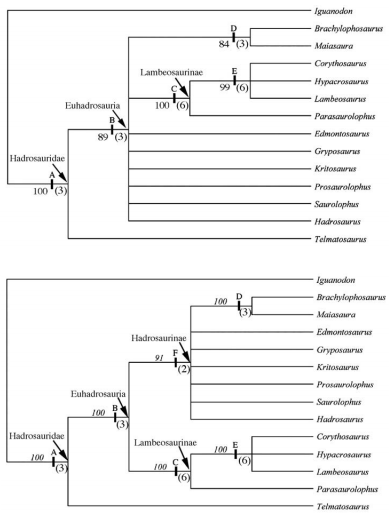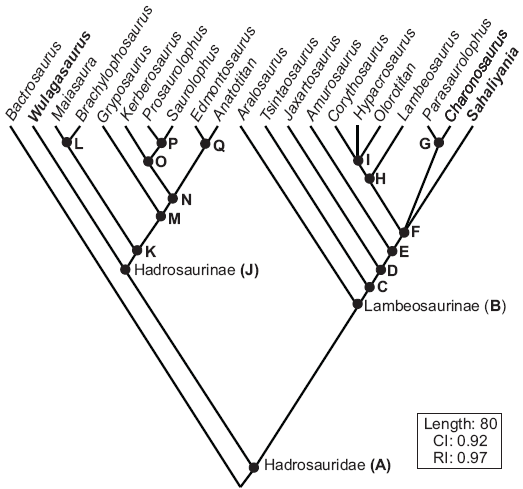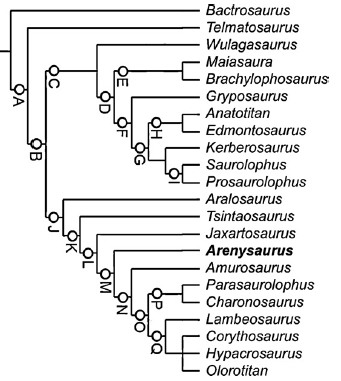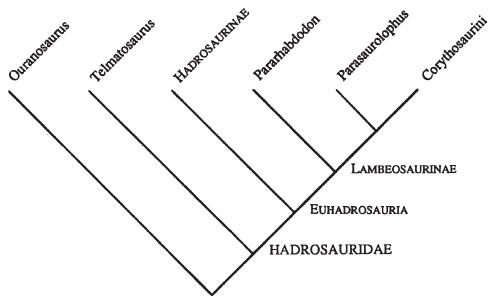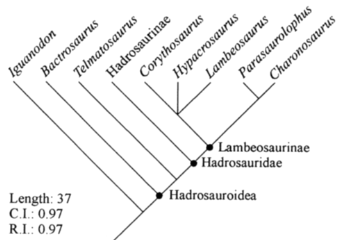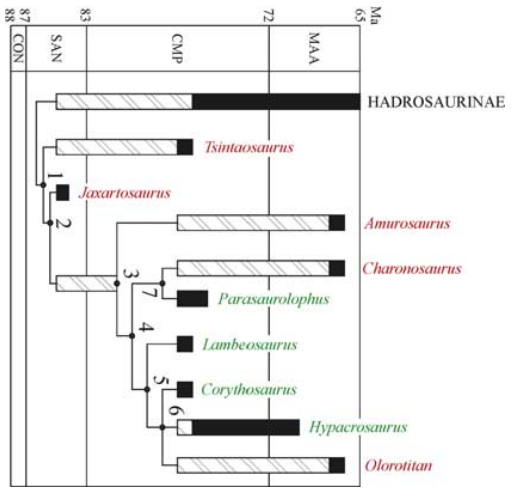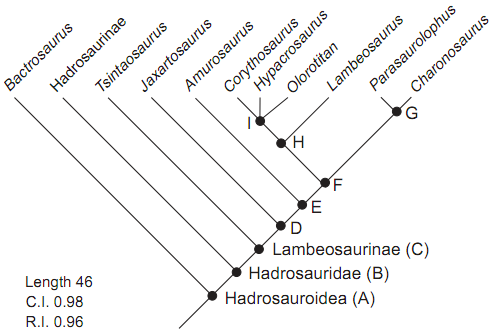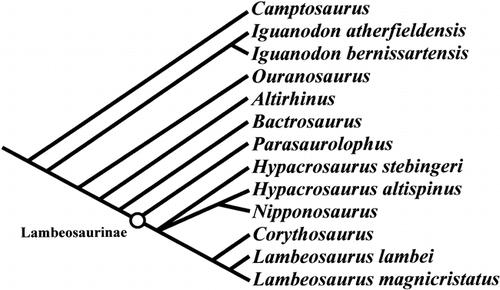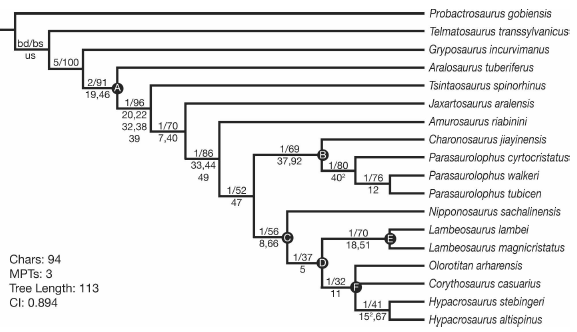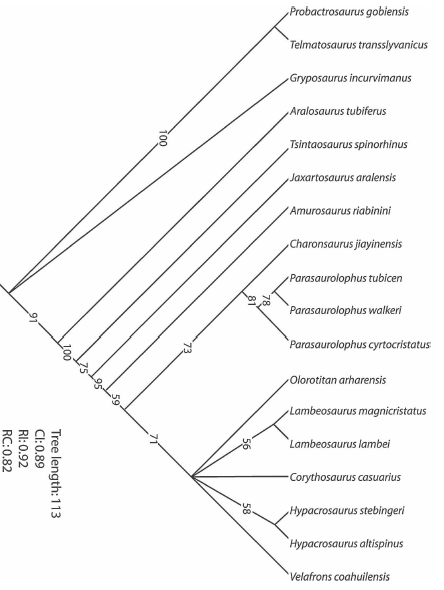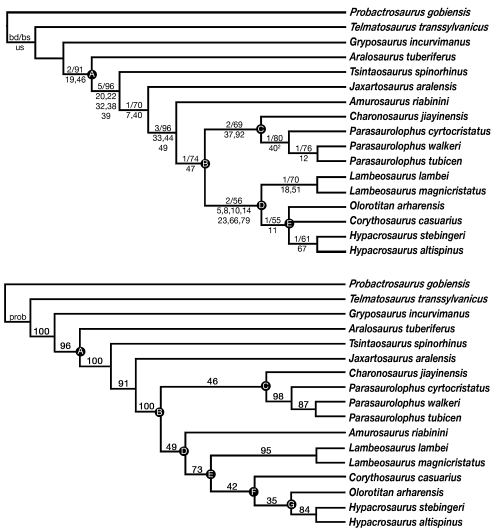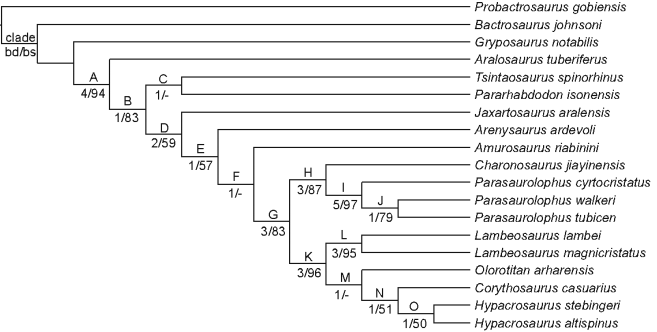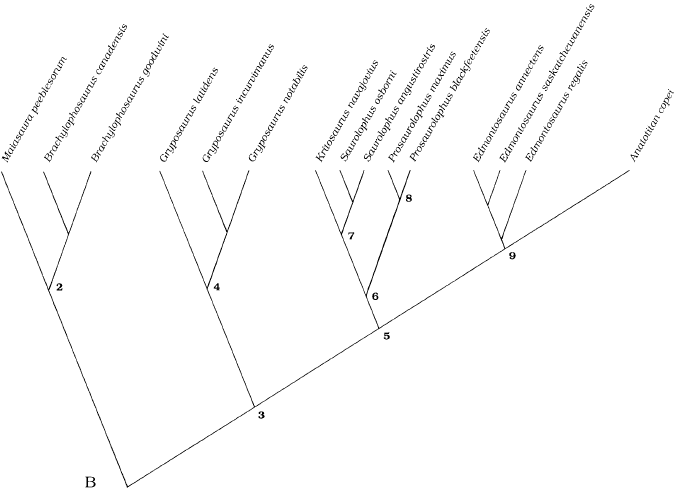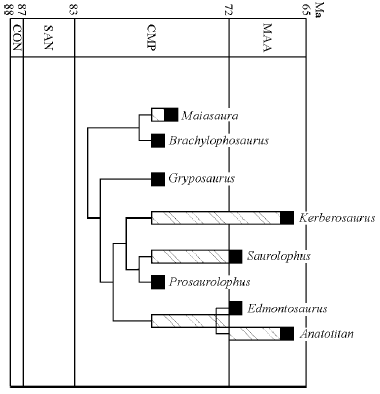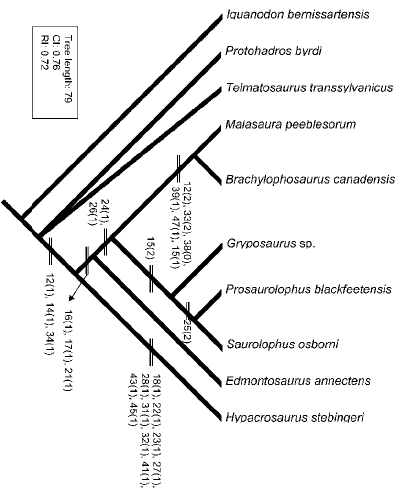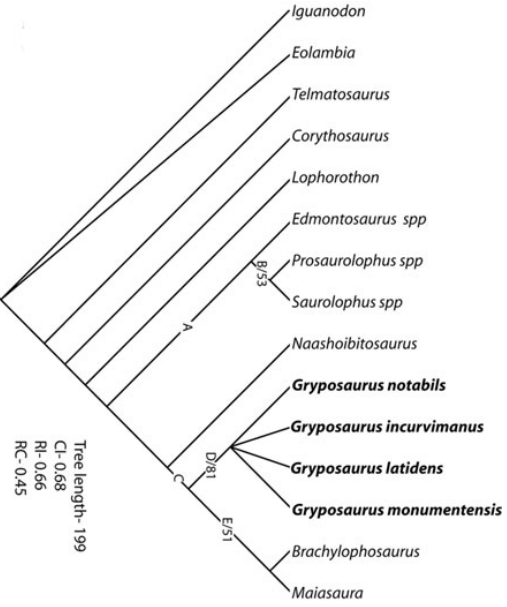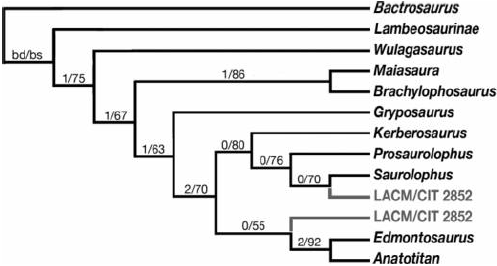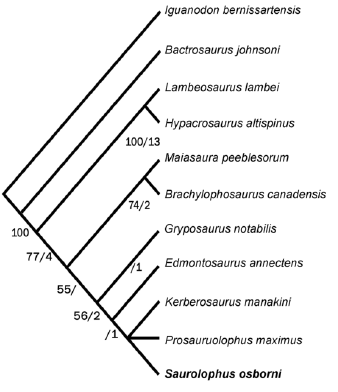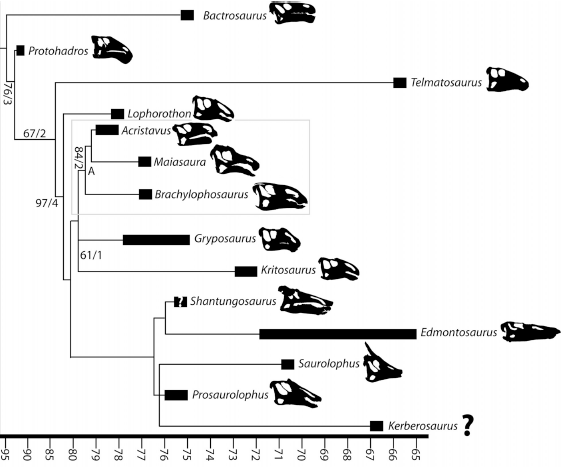Kategoria:Hadrosauridae
| Autor: |
| Maciej Ziegler |
Artykuł przedstawia nomenklaturę i filogenezę głównie bazalnych Iguanodontia (tj. nie należących do Hadrosauridae) ale także Hadrosauridae. Jest to zalążek przyszłego artykułu (jeśli możesz - napisz go!).
Nomenklatura
- Hadrosauridae (Cope, 1869)
- <Lambeosaurus lambei & Hadrosaurus foulkii (zmodyfikowano z Forster, 1997)
- Klad Hadrosauridae był definiowany rozmaicie (np. Horner i in., 2004 dodają do definicji dość bazalnego Telmatosaurus). Klad Hadrosauridae został po raz pierwszy zdefiniowany przez Forster (1997) jako <Lambeosaurinae & Hadrosaurinae. Hadrosaurus foulkii, który powinien należeć do Hadrosauridae, ma niepewną pozycję filogenetyczną, był rzadko umieszczany w analizach a jego pozycję w ramach obszernego kladu siostrzanego do Lambeosaurinae (nazywanego przeważnie Hadrosaurinae) przyjmowano a priori. Nowe, obszerne badania (Prieto-Marqueza (2010) wskazują, że Hadrosaurus jest bardziej bazalny.
- Saurolophidae (Brown, 1914 sensu Nopcsa, 1928)
- <Saurolophus osborni & Lambeosaurus lambei (Prieo-Marquez, 2010; zmodyfikowano z Wagner, 2001)
- Jako rodzina jest to młodszy synonim Hadrosauridae. Jeśli Hadrosaurus należy do Saurolophinae (zob. niżej), to także jako nazwa kladu jest to młodszy synonim Hadrosauridae.
- Lambeosaurinae (Parks, 1923)
- >Lambeosaurus lambei ~ Hadrosaurus foulkii v Saurolophus osborni v Edmontosaurus regalis (Prieto-Marquez, 2010; zmodyfikowano z Wagner, 2001; zmodyfikowano z Sereno, 1998)
- Corythosaurini (Glut, 1997)
- >Corythosaurus casuarius ~ Parasaurolophus walkeri (Evans i Reisz, 2007)
- Parasaurolophini (Glut, 1997)
- >Parasaurolophus walkeri ~ Corythosaurus casuarius (Evans i Reisz, 2007)
- Saurolophinae (Brown, 1914)
- >Saurolophus osborni ~ Lambeosaurus lambei v Hadrosaurus foulkii (Prieto-Marquez, 2010; zmodyfikowano z Wagner, 2001)
- Definicja Prieto-Marqueza (2010) wyłącza Hadrosaurus, jako nazwa kladu nie jest to więc młodszy synonim Hadrosaurinae, lecz może nim być jako podrodzina.
- Brachylophosaurini (Gates, Horner, Hanna i Nelson (2011))
- >Brachylophosaurus canadensis & Maiasaura peeblesorum & Acristavus gagslarsoni ~ Gryposaurus notabilis v Saurolophus osborni (zmodyfikowano z Gates, Horner, Hanna i Nelson, 2011)
Kladogramy
Zob. Iguanodontia#Hadrosauroidea
Lambeosaurinae i Saurolophinae
Analizy obejmujące zarówno przedstawicieli Lambeosaurinae, jak i Saurolophinae
Weishampel i Horner 1990
Kladogram z Weishampel i Horner, 1990 (brak analizy numerycznej)
Weishampel i in. 1993
Kladogram z Weishampel i in., 1993
Prieto-Marquez i in., 2006
Kladogramy z Prieto-Marquez i in., 2006B (cechy za Horner i in., 2004 z usunięciem 15 z nich i zmianą niektórych taksonów). Na górze ścisły konsensus, na dole 50 % majority rule.
Godefroit i in., 2008
Kladogram z Godefroit i in., 2008
Pereda-Suberbiola i in. 2009
Kladogram z Pereda-Suberbiola i in., 2009 (na podstawie Godefroit i in., 2008 z dadanymi Arenysaurus i Telmatosaurus, usuniętym Sahaliyania i dodatkową cechą).
Lambeosaurinae
Analizy skupione na Lambeosaurinae.
Casanovas i in. 1999
Kladogram z Casanovas i in., 1999
Godefroit i in. 2000
Kladogram z Godefroit i in., 2000
Godefroit i in. 2001
Skalbrowany stratygraficznie kladogram z Godefroit i in., 2001
Godefroit i in. 2004
Kladogram z Godefroit i in., 2004
Suzuki i in. 2004
Kladogram z Suzuki i in., 2004
Evans i Reisz 2007
Kladogram z Evans i Reisz, 2007
Gates i in. 2007
Kladogram z Gates i in., 2007 - 50% majority rule (na podstawie Evans i Reisz, 2007 z dodanym Velafrons).
Evans 2010
Kladogram z Evans, 2010 (na podstawie Evans i Reisz, 2007 z zmienioną 1 cechą). U góry drzewo największej parsymonii, na dole drzewo bayenesowskie.
Godefroit i in. 2012
Kladogram z Godefroit i in., 2012 (na podstawie Evans i Reisz, 2007 z dodamymi wieloma cechami, rewizją kilku z nich i dodaniem Pararhabdodon i Arenysaurus).
Saurolophinae
Analizy skupione na Saurolophinae.
Horner 1992
Kladogram z Horner, 1992 (brak analizy numerycznej).
Bolotsky i Godefroit 2004
Kladogram z Bolotsky i Godefroit, 2004.
Prieto-Marquez 2005
Kladogram z Prieto-Marquez, 2005 (na podstawie Horner i in., 2004 z 4 nowymi cechami i innymi taksonami).
Gates i Sampson 2007
Kladogram z Gates i Sampson, 2007 (na podstawie Horner i in., 2004 z nowymi taksonami i cechami).
Bell i Evans 2010
Kladogram z Bell i Evans, 2010 (na podstawie Godefroit i in., 2008 z dodanym Saurolophus morrisi LACM/CIT 2852).
Bell 2011
Kladogram z Bell, 2011.
Gates i in. 2011
Kladogram z Gates i in., 2011.
Bibliografia
Bell, P. R. (2011) "Redescription of the skull of Saurolophus osborni Brown 1912 (Ornithischia: Hadrosauridae)" Cretaceous Research, 32, 30-44.
Bell, P.R. & Evans, D.C. (2010) "Revision of the status of Saurolophus (Hadrosauridae) from California, USA" Canadian Journal of Earth Sciences, 47(11), 1417-1426.
Bolotsky, Y.L. & Godefroit, P. (2004) "A new hadrosaurine dinosaur from the Late Cretaceous of Far Eastern Russia" Journal of Vertebrate Paleontology, 24(2), 351-365.
Casanovas, M.L. Pereda Suberbiola, X., Satnafe, J.V. & Weishampel, D.B. (1999) "First lambeosaurine hadrosaurid from Europe; palaeobiogeographical implications" Geological Magazine, 136(2), 205-211.
Evans, D.C. (2010) "Cranial anatomy and systematics of Hypacrosaurus altispinus, and a comparative analysis of skull growth in lambeosaurine hadrosaurids (Dinosauria: Ornithischia)" Zoological Journal of the Linnean Society, 159, 398–434. doi: 10.1111/j.1096-3642.2009.00611.x
Evans, D.C. & Reisz, R.R. (2007) "Anatomy and relationships of Lambeosaurus magnicristatus, a crested hadrosaurid dinosaur (Ornithischia) from the Dinosaur Park Formation, Alberta" Journal of Vertebrate Paleontology, 27(2), 373-393.
Gates, T.A., Sampson, S.D., Delgado de Jesus, C.R., Zanno, L.E., Eberth,D., Hernandez-Rivera, R., Martinez, M.C.A. & Kirkland, J.I. (2007) "Velafrons coahuilensis, a new lambeosaurine hadrosaurid (Dinosauria: Ornithopoda) from the late Campanian Cerro del Pueblo Formation, Coahuila, Mexico" Journal of Vertebrate Paleontology, 27, 917-930.
Gates, T.A., Horner, J. R., Hanna, R. R. and Nelson, C. R., 2011. New unadorned hadrosaurine hadrosaurid (Dinosauria, Ornithopoda) from the Campanian of North America. Journal of Vertebrate Paleontology, 31(4), 798-811.
Gates, T.A. & Sampson, S.D. (2007) "A new species of Gryposaurus (Dinosauria: Hadrosauridae) from the late Campanian Kaiparowits Formation, southern Utah, USA" Zoological Journal of the Linnean Society, 151(2), 351-376.
Godefroit, P., Zan, S. & Jin, L. (2000) ""Charonosaurus jiayinensis n. g., n. sp., a lambeosaurine dinosaur from the Late Maastrichtian of northeastern China" Comptes Rendus de l'Academie des Sciences Series IIA Earth and Planetary Science, 330, 875-882.
Godefroit, P., Bolotsky, Y. & Alifanov, V. (2003) "A remarkable hollow-crested hadrosaur from Russia: an Asian origin for lambeosaurines" Comptes Rendus Palevol, 2, 143-151.
Godefroit, P., Bolotsky, Y.L. & Itterbeeck, J. (2004) "The lambeosaurine dinosaur Amurosaurus riabinini, from the Maastrichtian of Far Eastern Russia" Acta Palaeontologica Polonica, 49(4), 585-618.
Godefroit, P., Hai, S., Yu, T. & Lauters, P. (2008) "New hadrosaurid dinosaurs from the uppermost Cretaceous of north-eastern China" Acta Palaeontologica Polonica, 53(1), 47–74.
Godefroit, P., Bolotsky, Y.L. & Bolotsky, I.Y. (2012) "Osteology and relationships of Olorotitan arharensis, a hollow-crested hadrosaurid dinosaur from the latest Cretaceous of Far Eastern Russia" Acta Palaeontologica Polonica, doi:10.4202/app.2011.0051
Horner, J.R., Weishampel, D.B. & Forster, C.A. (2004) "Hadrosauridae" [w:] Weishampel, D.B., Dodson, P. & Osmólska, H. "The Dinosauria" Bwyd. University of California - Berkeley i Los Angeles, 438–463.
Pereda-Suberbiola, X., Canudo, J.I., Cruzado-Caballero, P., Barco, J.L., Lopez-Martinez, N., Oms, O. & Ruiz-Omenaca, J.I. (2009) "The last hadrosaurid dinosaurs of Europe: A new lambeosaurine from the Uppermost Cretaceous of Aren (Huesca, Spain)" Comptes Rendus Palevol, 8, 559-572.
Prieto-Marquez, A. (2005) "New information on the cranium of Brachylophosaurus canadensis (Dinosauria, Hadrosauridae), with a revision of it's phylogenetic position" Journal of Vertebrate Paleontology, 25(1), 144-156.
Prieto-Marquez, A., Weishampel, D. B. & Horner, J. R. (2006B) "The dinosaur Hadrosaurus foulkii, from the Campanian of the East Coast of North America, with a review of the genus" Acta Palaeontologica Polonica 51: 77-98.
Suzuki, D., Weishampel, D.B. & Minoura, N. (2004) "Nipponosaurus sachalinensis (Dinosauria; Ornithopoda): Anatomy and systematic position within Hadrosauridae" Journal of Vertebrate Paleontology, 24(1), 145-164.
Weishampel, D.B., Norman, D.B. & Grigorescu, D. (1993) "Telmatosaurus transsylvanicus from the Late Cretaceous of Romania: the most basal hadrosaurid dinosaur" Palaeontology, 36, 361-385.
Weishampel, D.B. & Horner, J.R. (1990) "Hadrosauridae" [w:] Weishampel, D.B., Dodson, P. & Osmólska, H. [red.] "The dinosauria" Berkeley, University of California Press, 534–561.
Braki
Brak kladogramów z:
Godefroit, P., Zan, S.-Q. and Jin, L.-Y., 2001. The Maastrichtian (Late Cretaceous) lambeosaurine dinosaur Charonosaurus jiayinensis from north-eastern China. Bulletin Institut royal des sciences naturelles de Belgique: Sciences de la terre, 71, 119-168.
Godefroit, P., Alifanov, V. and Bolotsky, Y., 2004. A re-appraisal of Aralosaurus tuberiferus (Dinosauria, Hadrosauridae) from the Late Cretaceous of Kazakhstan. Bulletin Institut royal des sciences naturelles de Belgique: Sciences de la terre, 74 (supp.), 139-154.
Hu C, Zhengwu C, Qiqing P, Xiaosi F. 2001. Shantungosaurus giganteus. 135 pp. Beijing, China: Hauyu Nature Trade
Zan & Jin, 2000 [tytuł nieznany]
Strony w kategorii „Hadrosauridae”
Poniżej wyświetlono 58 spośród wszystkich 58 stron tej kategorii.
